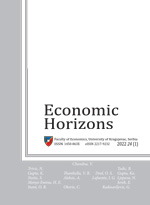Alternative regulatory approaches to managing banking crises
Violeta Todorovic
Faculty of Economics, University of Kragujevac, Kragujevac, Serbia
The functioning of banks in a deregulated and competitive market environment involves taking growing and complex business risks. Inadequate risk management on the part of bank managers leads to the emergence of problem banks and banking crises. Practically speaking, banking crises stand for an integral part of the development of banking systems in the modern business environment that can be characterized as complex, dynamic, heterogeneous and unpredictable. The negative effects of the bankruptcy of individual banks on the economic system require the timely establishment of adequate regulatory frameworks and undertaking interventionist measures for the rehabilitation of banking problems. The issue of managing banking crises, which has been discussed in the professional domestic and foreign literature for years, has been brought back into focus with the emergence of the global Subprime crisis. Therefore, the paper makes an attempt at a comprehensive analysis of the causes and ways of resolving banking crises. In addition to identifying the causes and substantial differences among the analyzed banking crises, the paper will review the relevance of the applied interventionist measures and the existing regulatory policies.
Keywords: banking crises, interventionist measures, bank regulations, regulatory reforms
JEL Classification: G21




